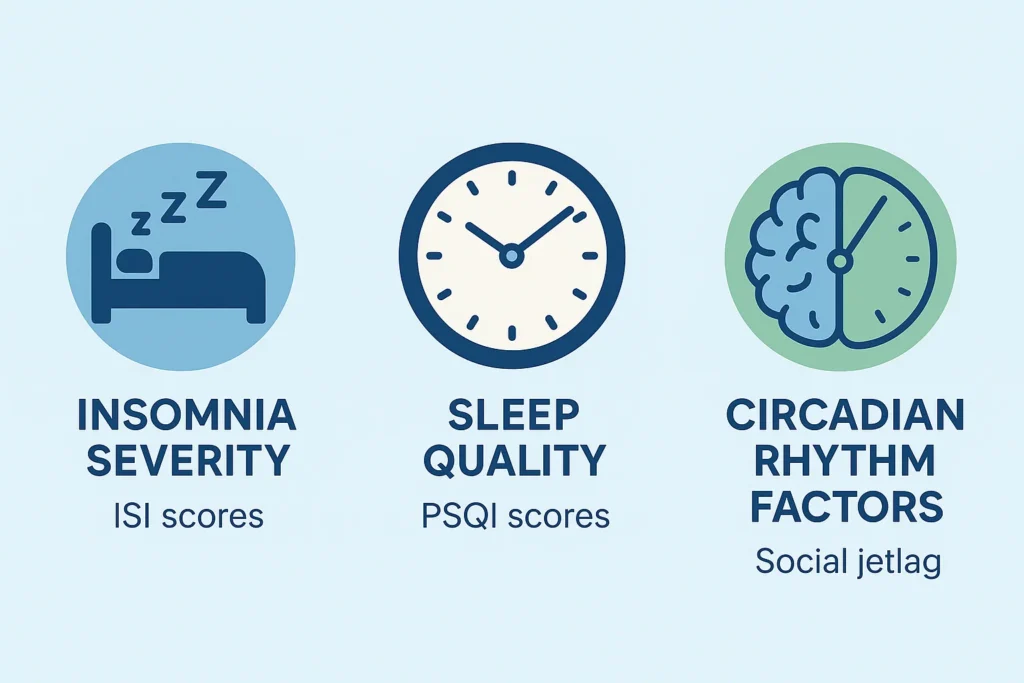Have you ever woken up tired or low the next day because your mind was racing, and you can not sleep? When you have traits of ADHD, then you could be facing a rumbling night. The paper published in BMJ Mental Health in 2025 investigates the relationships between ADHD characteristics, sleep disorders, and depression, and the association with the quality of life (QoL). The study can be extremely helpful to every person, who strives to comprehend these issues and live a healthier life. The research findings are going to be dissected and potential solutions that assist in controlling such problems shall be discussed.
The Study found that:
As noted by researchers such as Siddhi Nair and Sarah Laxhmi Chellappa (2025), 100,000 people (50,000 on the adult front and 50,000 on the adolescent front) were surveyed via the Netherlands Sleep Registry. It was an average of 13.86 years old with three-quarters of the women. With the help of such measurement systems as Insomnia Severity Index (ISI), Pittsburgh Sleep Quality Index (PSQI) and Morningness-Eveningness Questionnaire (MCTQ), the researchers explored the relationship between the ADHD characteristics and sleep, depression, and QoL.
The notable findings are:
ADHD and Sleep Disorders: Individuals with ADHD traits have eightfold higher sleeping disorders than the rest of the population; they are likely to be delayed in either doing or not doing sleep or getting sleepy during the daytime.
Risk of Depression: Adults with ADHD have a higher risk of major depressive episode than without 30-45 percent compared to 15 percent higher amongst the ADHD adults.
Quality of Life: Low QoL is associated with ADHD characteristics, depressed mood, and sleep difficulties aggravate the process. It was determined that sleep quality, insomnia, and evening circadian disturbances (such as social jetlag) are severe determinants of depression and QoL.
No Mediated Path: Unlike its expectation that sleep and circadian parameters would mediate the association between the ADHD characteristics and depression or QoL, it could not find any direct mediation effect, indicating that there is some complex relationship.
These facts emphasize that the characteristics of ADHD not only impair concentration but may also interfere with the sleep patterns, mood, and general life contentment.

Sleep is Important to ADHD and Depression
Sleep plays a seriously important role in mental well-being, and in the case of ADHD patients, it can be quite evasive. In the given study, PSQI was employed as an instrument to assess the quality of sleep because of its sensitivity to such aspects as sleep latency (the time taken to fall asleep), sleep duration, and daytime dysfunction. Any score of 5 or plus denotes the presence of poor sleep, and a majority of ADHD individuals scored higher than the allotted value. The ISI also demonstrated that the strength of scores above 10 is likely to result in insomnia and a score higher than 17 indicates imminent severe sleep problems.
There are also roles of the circadian rhythms- the clock of your body. The MCTQ measured the type of person (morning or evening) and measured social jetlag (difference between work days and free days sleep schedules). In patients affected by ADHD, improper sleeping patterns may exacerbate the condition itself, leading to increased indicators of impulsivity and mood swings that lead to depression and poorer QoL.
The Impact of ADHD, Sleep and Depression in the Quality of Life
QoL was measured using Satisfaction with Life Scale (SWLS). According to hierarchical regression models, the combination of ADHD characteristics with poor sleep and depression makes it highly possible to decrease life satisfaction. As an illustration, in Model 2, such aspects as severity of insomnia and sleep quality had the big impact on QoL (R 2 = 0.55), despite being controlled by age, sex, other factors. This implies that the solution to the problem in sleeping might be an important step in making life better with the ADHD features.
Expert Advice to Sleep Better and Feel Better
In case you or your loved one possess the traits of ADHD, the following are practical strategies that could help enhance the quality of sleep, mood, and QoL in line with the findings of the study:
A Sleep schedule: Maintain a regular bed- and wake-up time and stick to it every day, even weekends, to minimise social jetlag. Consistent routine assists in the regulation of your time energy clock.
Make a Bedroom Sleep Friendly: Darken the environment of the room, avoid noise and make it cool. To help curtail blue light use: stay off screens at least an hour before bedtime.
Restrict Stimulants: Reduce caffeine or nicotine intake, particularly during afternoon or evening because they are likely to increase insomnia.
Experiment with Relaxation: Use of relaxation practices such as deep breathing, meditation or smooth yoga can appease a racing mind so that one finds it easy to go to sleep.
Do some exercise: Exercise was not directly tested in the study, and moderate exercise such as walking or stretching, can enhance the quality of sleep and mood. Set yourself a target of 30 minutes on as many days as possible, and do not engage in any strenuous exercise just before sleep.
Professional Assistance: In case problems with sleep or depressions last, contact a healthcare worker. Special tactics based on cognitive behavioral therapy of insomnia (CBT-I) or ADHD can help.
Constraints and Future Projections
Strong evidence is found in a large sample size and strict methods, such as hierarchical regression and the use of the PROCESS software to analyze the study, but it is limited. There is no direct mediation effect; thus, indicating the possibility of the link between ADHD, sleep, and depression being affected by other factors such as stress or lifestyle, as well. Also, the research concentrated on a younger group (mean age 13.86) thus further studies should be done on older persons with the ADHD. Future research might focus on a particular intervention, exercise or light treatment, to enhance sleep and QoL.
Why This is Important to You
In case you show the characteristic features of ADHD, you may experience the feeling of being awakened at night or in a depressed state. This paper reveals that all these challenges are related but they are not impossible to solve. Maintaining high sleep hygiene and asking those who support you will help you increase your mental health and QoL. Most of these things seem really small, such as having a regular bedtime, taking a little walk every day, but these changes can go a long way.
Reference:
Nair, S., Deshpande, N., Hill, C., Cortese, S., Van Someren, E. J. W., & Chellappa, S. L. (2025). Associations of ADHD traits, sleep/circadian factors, depression and quality of life. BMJ Mental Health.

